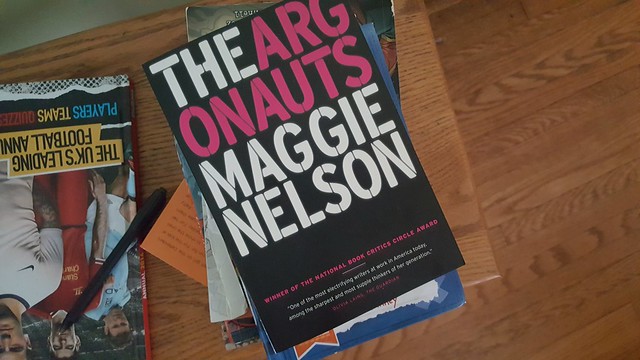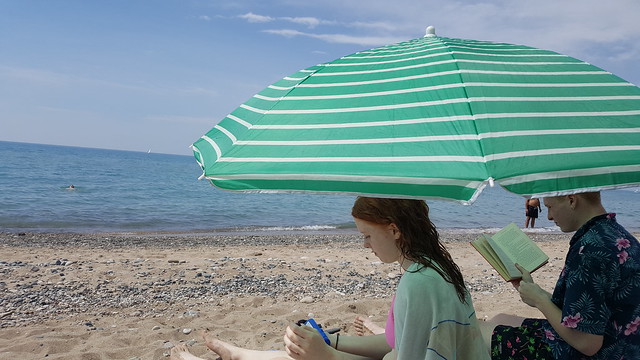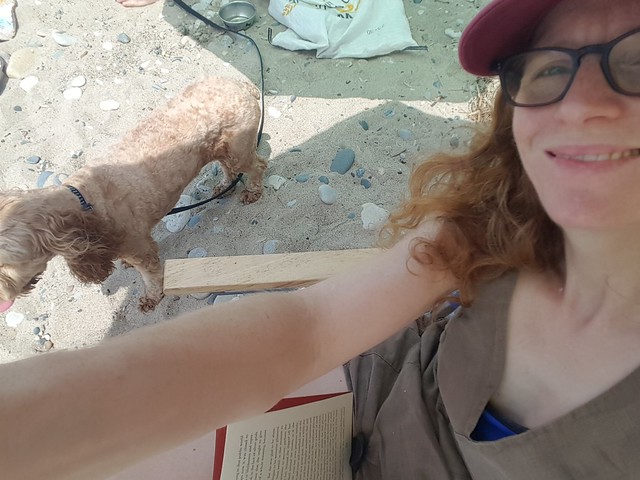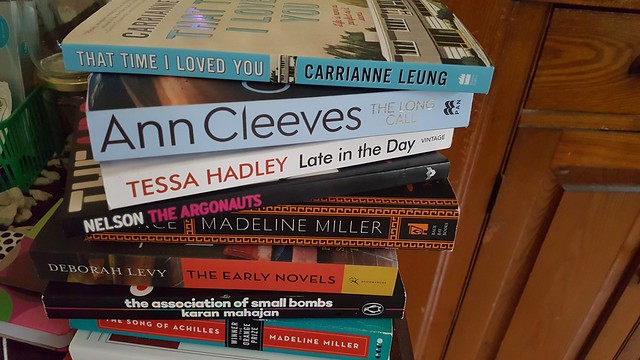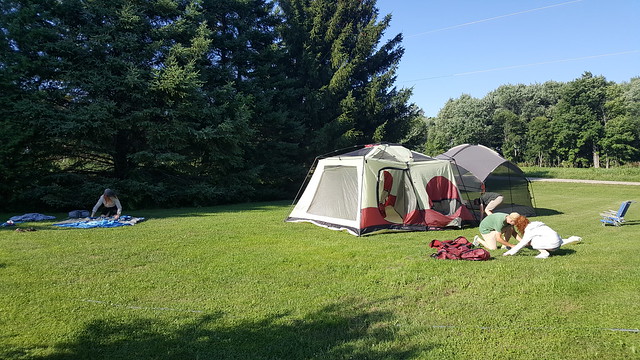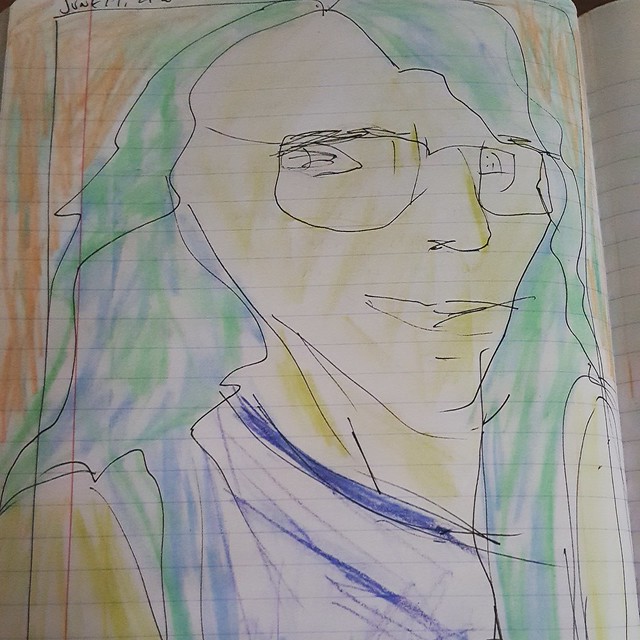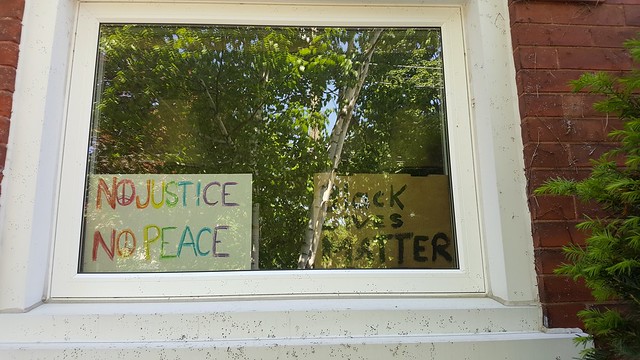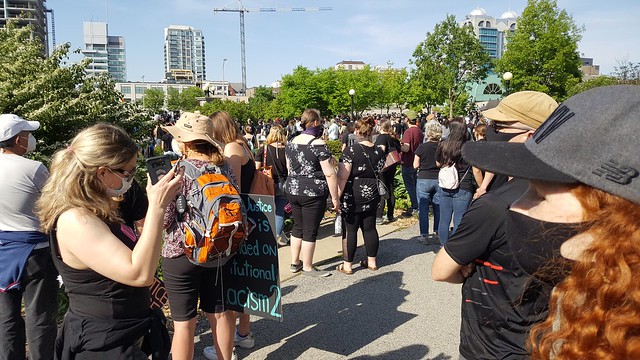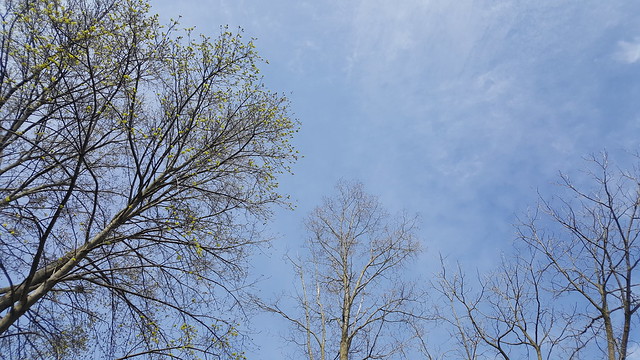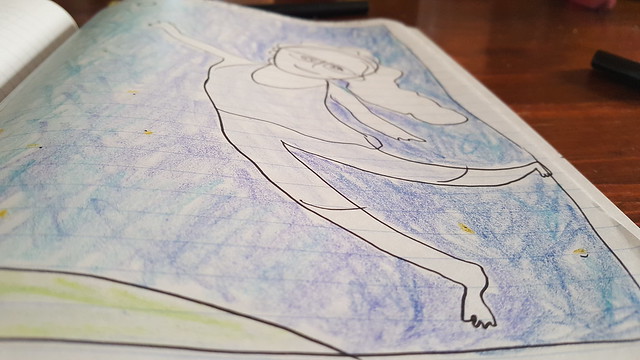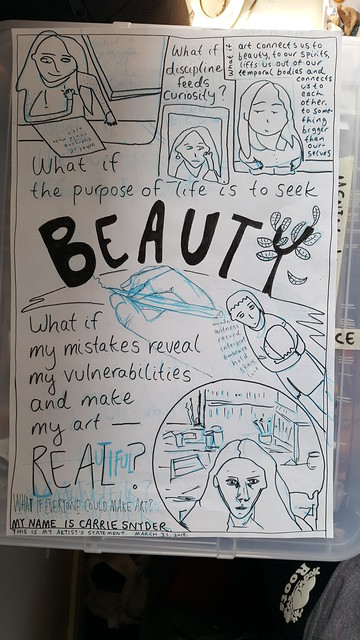Category: Politics
Thursday, Jul 30, 2020 | Big Thoughts, Confessions, Current events, Death, Manifest, Mothering, Parenting, Peace, Politics, Reading, Summer, Word of the Year, Work, Writing |

The bugs whirring in the trees. The sound of wind through branches. Cars and trucks grinding by on the nearby streets. I am gliding through these days. Maybe I want to keep this time, but maybe I also want to let it be. Let it roll like weather, let myself rest in the grass and look at the sky, so different every time, completely clear this morning with sunlight at the tips of the trees, the leaves lit from behind, green etched on pale blue.
I am waiting to discover something—what?—new?—about myself? about my purpose? about what I might become? I wonder why I always feel so sure that I am becoming—it seems so optimistic; because of course I am so sure that what I am becoming will be an improvement on this present iteration of self.
I’ve noticed that my flaws are magnified by this time of intense closeness with my little family unit. There are fewer of the everyday, outside, fleeting social interactions that help me to see myself differently; at home, my relationships tend to be more raw, less inhibited by boundaries and graces. In the outside world, I perform civility. Home is where I let my hair down (or wind it into a messy bun, more often!), seen only by those closest to me, who are also most bound to me and therefore most forgiving. Within these close relationships, I see reflected my limitations, my tendencies, my patterns, my behavioural tics and triggers. In truth, it is more often than not painful, humbling.
The question presents itself almost non-stop: Do I want to change? And if the answer is yes, what would I like to become, if not this?
Also, acceptance: this is what I’ve got to build upon.

This weekend, I listened to this On Being interview from 2013 with John Lewis. I’ve been thinking a lot about non-violent resistance, and what it means; and its relationship to my faith and faith tradition in the Mennonite church. I am planted in this soil. Here are my roots. How do I flower and grow and express “love in action”? The idea of resistance infers that against which you must resist—there is an implied relationship, a force that is pushing back. What John Lewis seemed to know is that in order for “good trouble” to bear fruit, you must present yourself at the edge, where you can meet resistance. You must be morally unassailable, dignified, restrained, patient, but also forgiving (of yourself and others). Non-violent resistance is hard, it requires self-discipline, rehearsal, practice (you learn to protect your head with your arms, you learn to curl into a ball on the ground, in practical terms). To win the moral battle, which may or may not move you closer toward your goal, you must be spiritually prepared to suffer. But to meet resistance effectively, you also need clarity of mission. The thing against which you are resisting must be clearly in view.

I’ve been thinking, too, that I lack clarity of mission. I don’t know my own goals. And this is why it feels like I’m waiting. (I’ve also been reading Maggie Nelson’s The Argonauts and thinking about the many ways in which human beings cause each other pain and are hurt, despite our best intentions, despite trying to protect ourselves; and how powerless that can make us feel, to act, to respond, to seek out relationship with others.)
re resistance, re mission, re goals, just found this in my notes: I still need to write that blog post about the flaws in the system. Which flaws? Which system?
Too many flaws, too many systems.
On this subject, more to come. But I shall spare you and stop here for now.
xo, Carrie
Wednesday, Jul 22, 2020 | Adventure, Art, Big Thoughts, Book Review, Books, Current events, Fun, Good News, Holidays, Politics, Publishing, Reading, Spirit, Work, Writing |

A marvellous way to escape from the stasis and repetition of the everyday is by reading books. I’ve been reading more books these days than I have for a very long time, reading not merely for professional purposes, but as a fan.
And I just want to say: Read, friends, read!
Read a book! You won’t regret it! Sink in, let your brain get accustomed to taking the long, slow, scenic route instead of scrolling yourself down an endless wall of text. This might sound like self-serving advice, but really, I feel born-again.

Read a book!
It’s an immersion in a way that other forms of “entertainment” and learning are not, because it also involves engagement, as your mind works to build worlds and make connections. There are ideas and images forming inside your brain—new to you, exciting, challenging, alarming, frustrating, fresh and unknown—as you follow the line of words across the page. These brand-new images are transferred into the landscape of experiences, memories, and images that already belong to you. Connections between these worlds pop and crackle and spark something that has the potential to feel revelatory and transformative (at best), or at least interesting, different from your usual point of view.
Inside your mind, as you read a book, you’re actively creating something that is both collaborative and personal. You’re reading something written in a different time that is speaking to where you are right now (or attempting to). I think this is why it can feel like you know an author really well—because you’ve actually made something together when you read their book, even when you’re collaborating across cultures, languages, places, and times.

This past weekend, in related news, we camped at my brother and sister-in-law’s farm, and went to the beach. And we read books. I even stayed up late one night to finish a conventional but highly entertaining murder mystery, borrowed from my brother (Ann Cleeves, The Long Call). I’d finished the book I’d brought camping (Tessa Hadley, Late in the Day), a book with which I had an ongoing argument, as it featured wealthy white British characters, several of whom were artists; at times, I strongly disliked everything about the book, but then bits seemed to capture something important about creating art, especially as a woman, and how valuable it is to have a champion, especially a patron with money and influence, but also how dangerous. In the end, it was the engagement with ideas, the argument with the book itself, that kept me transported and hooked.

Books transport me in so many different ways. Reading Carrianne Leung’s That Time I Loved You brought me into characters who broke my heart, and with whom I craved even more time, and afterward I wanted to talk about these people like they were real; reading Kiley Reid’s Such a Fun Age was both accusation and encouragement to reflect on my own transactional relationships, even while it pulled me along with a propulsive plot; reading Glennon Doyle’s Untamed stirred up a mixture of emotions, including the desire to protect this seemingly vulnerable writer from her own blind spots, and respect for occasions of raw insight.
I’ve just started Maggie Nelson’s The Argonauts, and already I feel like the top of my head has been lifted to make room for more seeing, more questions, more ways to jab at and unpeel my identity, my ways and means of performing myself.

Writing is not a glamorous job. Progress is made at a glacial pace, if what you’re doing can be even be seen as progress; it might be more rightly called meandering, looping, wondering, wandering. You can’t see what you’re making. You can’t know how it will be received, if it ever gets loose, let alone completed. You don’t know what arguments a stranger might have with what you’ve conjured on the page.
It often doesn’t feel like important or valuable work; certainly it doesn’t feel very useful a lot of the time. But when I read books, I know exactly why I write, and why I’ve chosen this wondering, wandering path. When I read, I feel belonging and expansion, both, at once. When I write, I feel like a giddy participant in a long, ongoing conversation about being alive, being a part of it all, in my own time and place and body, right now.

Right now, Canadian publishing is suffering. (Read this, if you want to know more about the nitty-gritty business of the industry.) But listen up, friends! If you’re lucky, you still have an independent bookstore operating despite the pandemic, and they’re the ones (according to the cited article) who have the potential to keep this fragile/tough cultural industry alive. All the books mentioned above (and many more!) were purchased at Words Worth Books in uptown Waterloo. Order online, pick up in the alley behind the store; or they deliver locally. Do a bit of searching. Find what’s available near you. There are many independent options other than Amazon, and these options are run by people who love books, too. They love reading. They believe in the collaboration between words on the page and individual minds. They want to challenge your horizons, send you on adventures, keep you up late at night. Amazon’s algorithm just wants to sell you more of the same.
Those are my thoughts for today. More ideas, coming soon.
xo, Carrie
Sunday, Jun 28, 2020 | Big Thoughts, Confessions, Current events, Death, Dream, Lists, Manifest, Politics, Spirit |

Last post, I wrote, somewhat tongue in cheek (I hope!) that it had just occurred to me that as I get older, I could be getting worse not better.
Here’s what comes to mind when I think worse, not better: Less ambitious, less courageous, more cautious, more conservative, less likely to throw myself into something new wholeheartedly, crabbier, boring, predictable, less engaged with the world, more fearful, content with the status quo, narrow-minded, petty, envious, self-indulgent, less willing to give of myself.
You probably have your own personal list of worse, not better.
Which makes me wonder, what’s on the better, not worse list? Funnier, looser, less concerned about what others think, flexible, giving, generous of mind and heart, trusting myself and others, sharing responsibilities, moral clarity, openness, curiosity, wonder, kind and tough, practical and impractical, disciplined and relaxed.
Oh dear. Some push-pull on that list.
What if: Instead of fearing that I’m getting worse as I get older, I acknowledge that I’m changing? My ambitions are changing. My desires are changing. Having checked the major life goals off my list (education, family, career), it seems harder to name what I want. Maybe the goals at this stage (mid-40s) are looser.
At moments, I do sense a wholeness, a oneness, an understanding of purpose that feels deep and wordless, and wondrous. But it is fleeting, as ecstatic experiences tend to be. I get the feeling, in these moments, that our purpose here on earth is to be brazenly present and wholly human, insatiably curious vessels of grace poured into imperfect containers, cracked and fragile and not meant to last. We’re meant to be brief, and aware of our limitations; in our brevity, we sense eternity; in our faultiness, generosity of spirit.
I used to dismiss religion’s various visions of heaven or paradise. Hated it, actually. But I’m starting to understand, more deeply, why these visions exist. Because here on earth, we’re bound to invent a series of flawed experiments, no matter how heart-felt our intentions. Criticism is easy, also necessary, also demonstrates involvement in the process; but the ease with which a critic can point out flaws, versus the challenge to she who attempts change, or reversal, or to implement a new idea, structure, system, vision, dream—well, it’s a pretty massive gulf. It’s why Canada keeps commissioning reports and implementing few/none of the reports’ recommendations.
The will to act almost has to be collective.
And while we wait for collective action, people suffer. As individuals, we see our neighbours suffering, and we find band-aid solutions, work-arounds, we tinker with the machinery we’ve inherited, upheld by greed and power and inertia. But we can’t knock it down till enough of us amass at the gates and demand change.

I’ve been thinking a lot about hope. Hope despite set-backs. Hope despite seeing the same script played again and again. How to serve hope, see hope, carry hope? And I think, ah, that’s where the vision of heaven comes in. It’s something to hold onto, to imagine, to dream of. It’s often present in art. Think of gospel songs: crossing the river, being called home, carried home, the relief and sweetness of rest after labour. This represents what we long for, and can’t quite glimpse. Wholeness, resolution, peace.
Yes.
Yes.
I can’t possibly know exactly what a better world would look like, let alone figure out how to get there. Just like I can’t even seem to see what a better Carrie would look like, let alone figure out how to get her there. I do hope I’m not getting worse. I hope the small actions I undertake every day in hopes of being healthy, humble, self-aware, humorous, curious, generous, trustworthy and trust-giving, are not outweighed by my multitude of neurotic tics, anxieties, fears, lethargy, indecision, vanity, ignorance, injury and self-interest. But who knows, really?
I’ll just have to hope without knowing, be without knowing, and take action without knowing, exactly, the consequences. Better or worse? Change keeps happening whether we notice or not, sanction it or not. So, whether better or worse, definitely different. Hopefully braver. Hopefully clearer. Hopefully lighter. But who knows.
Watching: Chimamanda Ngozi Adichie’s “The Danger of a Single Story” (Ted Talk)
Listening: Today’s program from Tapestry, on “how to ethically navigate the pandemic’s new normal as restrictions begin to lift” (CBC Radio)
xo, Carrie
Thursday, Jun 4, 2020 | Confessions, Current events, Manifest, Politics, Stand |

Today, I’m researching power structures in late-Elizabethan England, but I’m thinking about power-structures in 2020 North America, and especially, I’m thinking about self-expression. The freedom to think and express what is on your mind. The freedom to be yourself. What does that even mean? I think we’re getting a glimpse into what that means to people of colour living in white supremacist systems; and for those of us who have had the privilege of expressing ourselves freely no matter the circumstances (by and large), it’s a wake up call. I’ve been watching Amber Ruffin’s stories of her encounters with police, on Seth Meyer’s show this week. I want to shout: I can’t stand this! It’s not fair!
It’s not fair! Why did I think things had changed? I think I wanted to believe that in some way, we could all live as equals, especially here in Canada. Easy for me to think. I have white skin. So do my kids. I have never, not once, had an encounter with police where I thought: I might die. Listen to Amber’s stories. What struck me about the one I heard today, which I’ll try to embed below, is how the situation forced her to comply, even to agree with the cop who was threatening Amber on her own front porch—she had to agree, to comply, because it was the only safe thing to do. She couldn’t say: lady, you are lying. She had to swallow the lie.
Freedom of expression: erased. The ability to say what she was thinking: erased.
I get that as individuals we “police” ourselves all the time, we decide what’s safe to say or not say given the circumstances, and that there are legitimate reasons to self-censor, including to be polite, or not to hurt others. I get that. But this isn’t the same. It’s always chilled me to think about what happens to artists in countries where everyone is expected to think the same—or to pretend to. I’ve tried to imagine what I would do if I could not write freely. If every word I placed on the page had to be weighed, or coded, if I was forever compromising the truth of my own experience, hiding it from view. How would it change me? How would I survive self-negation? Well, guess what, Carrie, this is happening right now all around you. You just haven’t wanted to see it.
To be told who you are by someone else: happening now.
To be constrained by pre-judgement: happening now.
To alter your behaviour so as to survive: happening now.
I’m gonna quote Scott Woods’ blog post, titled “5 Things No One is Actually Saying about Ani Di Franco and Plantations,” written in 2014, which has been making the rounds, because he says all of this, and much more, much better than I can:
“The problem is that white people see racism as conscious hate, when racism is bigger than that. Racism is a complex system of social and political levers and pulleys set up generations ago to continue working on the behalf of whites at other people’s expense, whether whites know/like it or not. …
Here’s the deal with racism:
Racism is an insidious cultural disease. It is so insidious that it doesn’t care if you are a white person who likes black people; it’s still going to find a way to infect how you deal with people who don’t look like you. Yes, racism looks like hate, but hate is just one manifestation. Privilege is another. Access is another. Ignorance is another. Apathy is another. And so on. So while I agree with people who say no one is born racist, it remains a powerful system that we’re immediately born into. It’s like being born into air: you take it in as soon as you breathe. It’s not a cold that you can get over. There is no anti-racist certification class. It’s a set of socioeconomic traps and cultural values that are fired up every time we interact with the world. It is a thing you have to keep scooping out of the boat of your life to keep from drowning in it. I know it’s hard work, but it’s the price you pay for owning everything.”
We are living in a moment. It is a very particular moment. It’s not the same moment we thought we were living in, scarcely a week ago. Now it is another moment, replete with other images, some combined with where we were and still are (masks), and some brand new (protestors).

I decided, this week, to attend the protest organized by Black Lives Matters in my home community. I did so even though I’ve been faithfully quarantining and have scarcely left the house for the almost three months. (Yes, I wore a mask and so did almost everyone in attendance.) In Scott Woods’ list of the manifestations of racism, I see myself. I see my privilege, my access, my blindness, my errors. I know that I stick my foot in my mouth time and again due to my ignorance and that others have been generous enough to forgive me for this. I don’t claim to understand beyond my own life experience, despite living a life of imagination. I do not understand. But I can’t stand living like this—in ignorance, in a place where others living next to me are not free to move, speak, be, because of the colour of their skin. I refuse apathy.
When Trump held up the Bible, I recoiled. I’m Mennonite, and even though I have my own arguments with the Bible, the image looked utterly blasphemous to me. I thought: his understanding of the Bible is so superficial, he thinks it’s just a prop, used to intimidate, to confer power, to rally to violence. Oh, and he is right, because it has been used like that, and for that.
But for many of us, our relationship with the Bible is much more complex. Conflicted, maybe, yes, but we also know it as a comfort, with words that connect us with others who are seeking truth, who are suffering, struggling, who know Jesus as a shit-disturber, someone who sought to turn the power structure upside down, a healer who invited tax collectors and women to join the circle, who asked his followers to give everything away and come with him. Give everything away! I don’t think Trump has read that part.
But the truth is, even though I have, I haven’t given much away, let alone everything. I’ve sacrificed almost nothing, really. I’ve been assuming that goodwill and kindness would be enough to bring everyone along on equal terms, and holy shit, that is nowhere near enough. So I ask myself: What am I willing to give away? What am I willing to sacrifice, to challenge, to dismantle, to disrupt, am I willing to feel discomfort and get over myself, and get out of the way?
Discomfort. I think that’s step number one for me, and dammit, isn’t that a doable ask? Lord, grant me the humility to get comfortable feeling discomfort. Being challenged. Admitting when I’m wrong. Although the truth is, step number one has been GRIEF and RAGE.
Because this can’t go on. There’s too much at stake.
xo, Carrie
Tuesday, May 5, 2020 | Art, Current events, Fire, Good News, Manifest, Money, Organizing, Politics, Publishing, Spirit, Stand, The X Page |

Starting today, new stories from the 2020 X Page Workshop are being published daily by The New Quarterly. Below, is our theatre director’s introduction to the online series.
Today’s story, which would have been the opening performance onstage, is called “Pant Rant.” I remember hearing the first draft of “Pant Rant” being read during a small-group workshop and being totally blown away; afterward, we all sat in silence, rocked by the rhythm and depth of the raw words. “Pant Rant” is a gritty, rich and poetical examination of mental toughness in defiance of persistent indignities endured for the sake of survival. At least, that’s how I read it. I wish you could hear Xiao tell her story in her own voice; instead, it’s her gift to us on the page. I find this story especially resonant as I think about the people who are working in dangerous conditions, physically and emotionally, in places like meat-packing plants and long-term care homes, performing difficult tasks that the rest of us prefer not to think much about.
You can read “Pant Rant” here.
I look forward to highlighting more stories in the days and weeks to come.
Thank you for reading, and for your support of The X Page project.
xo, Carrie
Wednesday, Mar 25, 2020 | Big Thoughts, Current events, Family, Lists, Manifest, Meditation, Peace, Politics, Spirit, Stand |

Five things I am grateful for
1 My kids’ teachers, who have been reaching out to their students with such empathy about the unprecedented collective experience we’re sharing; among their offerings are optional assignments that invite connection with other students, and even breathing techniques for finding calm during anxious moments. Thank you to all the teachers who are doing their best to support their students right now. #education

2 My kids, who have been finding ways to keep themselves soothed and entertained without entirely relying on screens. This includes doing puzzles in their rooms, figuring out how to play Battleship with a friend via FaceTime, practicing piano, baking cookies and sour cherry bread, kitchen clean-up, imaginary games in the backyard, soccer, playing with Rose, drawing with me or painting with Kevin, and above all, accepting the situation rather than fighting it. #parenting

3 Kevin, whose bottomless well of optimism, flexibility and creativity is an especially useful toolbox right now (to mix metaphors!). He’s self-employed, I’m self-employed: generally speaking, we’re both tolerant of risk, practical, disciplined, and comfortable with the necessary short-term pivot in service of deeper, long-term goals. It’s a partnership suited to current circumstances. I’m also thankful that I can tell him what I really think, even if it ain’t pretty. #marriage

4 The pair of cardinals in our front bush, who popped out yesterday as if to say hello, just as I was looking out the front window. The peach-coloured female hopped onto the windowsill and cocked her head, inches from me on the other side of the glass. I held my breath. #nature

5 That everything I’m doing right now feels like it has spiritual purpose: it’s a gift. The focus of my waking hours seems to be to seek the spirit, nourish the spirit, bring forth the spirit, pay attention to all in my life that is spiritual. Practice, pray, reflect, share, write, dream. I’m loving all the online tools available for connecting with others. Sibs night via Zoom. Church service via YouTube and Skype. My friend Kasia’s yoga, live-streamed via Facebook into my tiny peaceful office every evening at 8PM. I have more time to spend meditating every day, accompanied by beautiful poetry podcasts or meditation reflections. It feels like my emotional life is closer to the surface and more visible, plainer, simpler; I feel more vulnerable, but also quieter. Within the restlessness, I’m finding stillness. There isn’t much I can do to help at the moment, except stay home. But that gives me even greater permission (if I need it, and sometimes I do!) to pause, breathe deeply, sense connection, reflect on the ties that bind us together, and pray for the possibility that our global community may unite around principles of mutual protection, dignity and care. #hope
xo, Carrie
Page 3 of 10«12345...10...»Last » 


